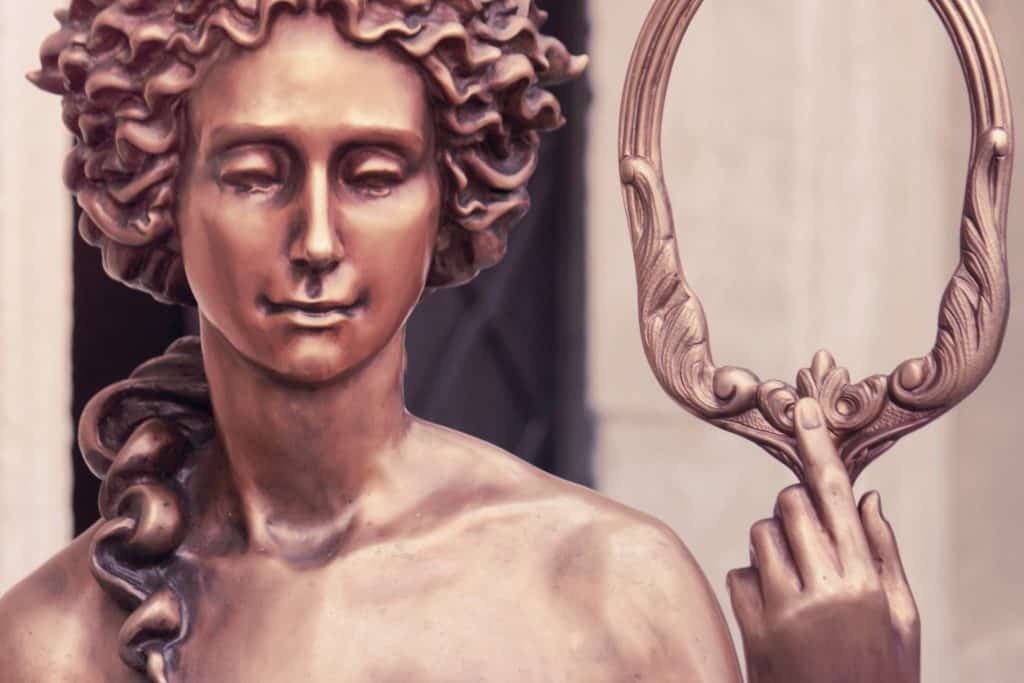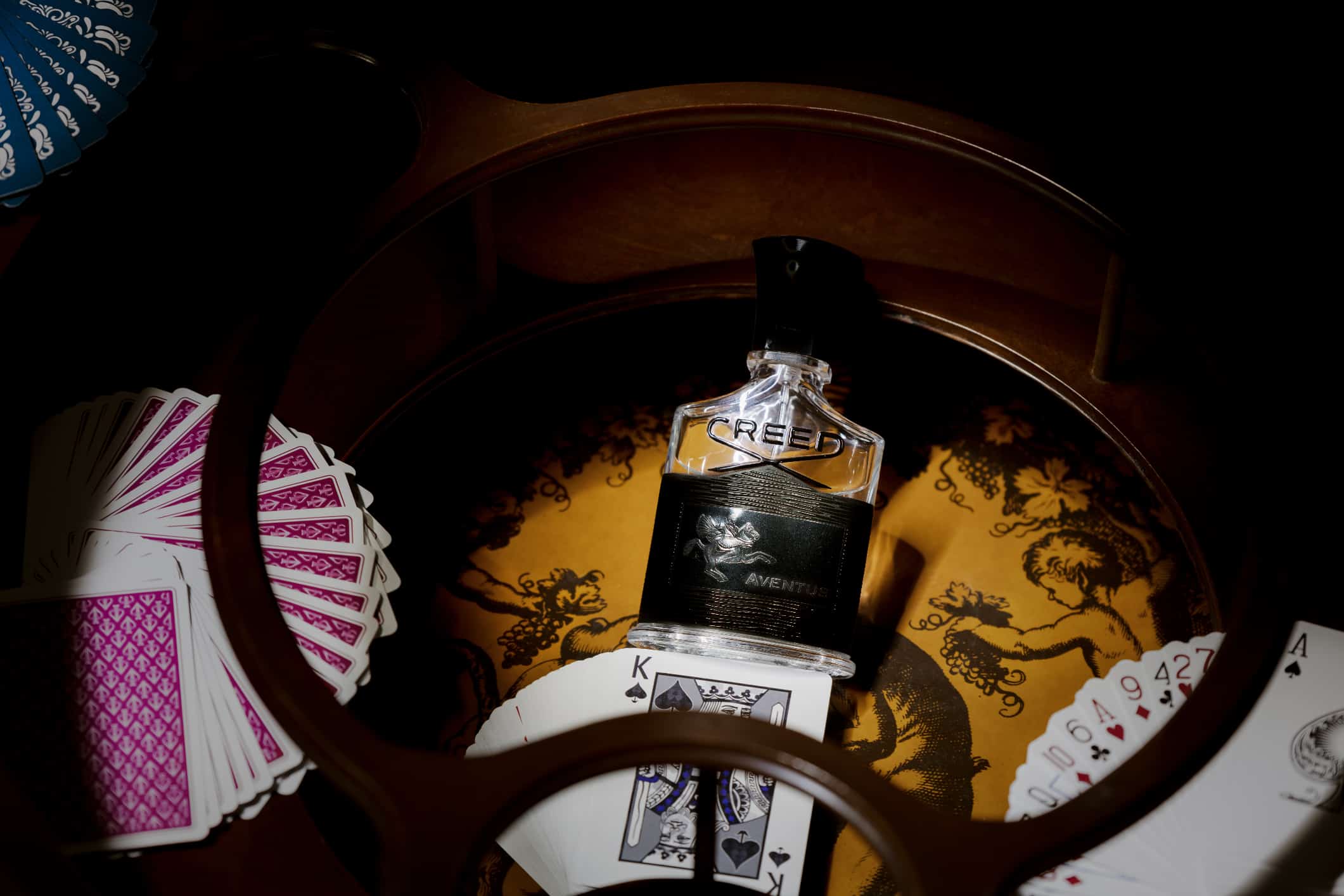Ancient peoples had a god or goddess for almost everything you could imagine.
There were gods of beer and wine, gods of lust and restraint, gods of blood and murder, gods of the kitchen and the hearth, gods of money and trade, gods of the wind and the sky, gods for everything great and small.
So it would make sense that there was a god (or gods, rather) of perfume in the ancient world.
There was more than one ancient god of perfume. Nefertem was the Egyptian god of fragrance, but there was also Shesmu, the god of perfume, wine, and blood, and Bastet, goddess of perfume and cats. Aphrodite is associated with perfume in ancient Greek myth, as well as Philyra, a water-nymph whose domain was perfume and beauty.
Let’s take a closer look at these ancient gods of perfume.
Perfume in the Ancient World
Perfume was highly prized in the ancient cultures of the Mediterranean and the Near East.
Perfumed oils rich with precious ingredients like jasmine, rose, myrtle, cedar, myrrh, frankincense, calamus, styrax, cardamom, cinnamon, and labdanum adorned the bodies of the pharaohs of Egypt, and even accompanied them into the afterlife, as they were buried with them in their tombs.
These oils served different purposes. Of course, just as today, ancient peoples wore perfumes for sheer pleasure and enjoyment.
But perfumes were often used for medical reasons, either as aromatherapy or as curatives. Perfumes were prescribed as balms for skin inflammation or burns, applied as a kind of proto-sunblock, or huffed to soothe stomach aches, lessen anxiety, or endow vigor and vitality.
In ancient Egypt, where cleanliness was next to godliness, perfumes were a critical part of any proper hygienic regimen. One ate, bathed, and, if one could afford it, applied a luxurious perfume oil to seal the deal.
Finally, perfumes and fragrances served a religious function in ancient societies.
Incense, then as now, was considered as a method of parting the veil between the human world and the realm of the gods. Many of the first perfumes had their origin in incense blends, and ancient priests could be said to be some of the first perfumers.
Both in ancient Egypt and ancient Greece, wearing perfume was said to please the gods.
But who were these gods that so prized perfume?
Nefertum
One of the most commonly known gods of perfume is the ancient Egyptian god Nefertum.
Depicted as a handsome young man with a fragrant blue lotus flower sprouting from his head, Nefertum was the son of Ptah, one of the creator gods, and Bastet, herself a goddess of perfume.
He was originally an aspect of the god Atum, one of the most important gods in the Egyptian pantheon, a creator god and the god of the evening sun. Nefertum later came to be seen as the grandson of Atum, and associated with Ra, the primary sun god. He was referred to as, “the lotus blossom which is before the nose of Re [Ra].”
Nefertum was considered to spread fragrance wherever he went, and caused flowers to bloom. He was also considered a god of healing and a soother of suffering.
For this reason, Nefertum was one of the most popular ancient Egyptian deities, and it was common to carry statuettes of Nefertum on one’s person as a good luck charm.
Bastet

Nefertum’s mother was Bastet, a cat or lion-headed goddess whose domains were protection, cats (of course), perfume, children, fertility, pregnancy, and war.
Quite the jack-of-all-trades.
Originally considered a fierce warrior goddess, she later came to be seen in a gentler light. Just like cats are tender with their young, so Bastet was viewed as a protective mother goddess who protected the kingdom from enemies and the body from malignancy and disease.
Perhaps there is some link between her protective nature and perfume, since perfumes were as much medicinal as they were cosmetic. And it’s no secret that cats, especially big cats like lions and tigers, absolutely love perfumes.
Shesmu
A less well known ancient Egyptian deity associated with perfume was the lion-headed god Shesmu (sometimes written as Shezmu).
A contradictory and mercurial god, Shesmu was both the lord of wine and perfume, whose responsibility it was to make fine perfume oils and ointments for the gods, but also a god of blood who killed and dismembered other gods in order to provide food for pharaohs as they journeyed through the afterlife.
His wine press was sometimes depicted with human heads instead of grapes, and in the rare cases that he was depicted in art, he was commonly seen holding a butcher’s knife.
A murderous lion-headed guy who also knows how to make a mean perfume? I’ve seen stranger gods in ancient mythologies.
Philyra
Moving to the other side of the Mediterranean, Philyra was a minor deity associated with perfume in ancient Greek myth.
Philyra was one of the Oceanids, commonly known as water-nymphs, the countless daughters of the Titans Oceanus and Tethys.
Philyra was far from a major deity of the ancient Greek pantheon, but is known for being one of the lovers of Cronus, the father of Zeus, with whom she had a son, Chiron, the first centaur. She also discovered paper, and taught writing to humanity. Additionally, Philyra was associated with beauty, healing, and, of course, perfume.
Aphrodite

Although not explicitly considered to be a goddess of perfume, Aphrodite, the Greek goddess of love, sex, and beauty, had the realm of sensuality and seduction in her purview, and perfume, then as now, was considered a potent weapon of coquetry and courtship.
Her temples were always well perfumed, and the Graces, part of Aprhodite’s personal posse, were known to baste her in sweet-smelling perfume oils like a Thanksgiving turkey in gravy.
More tangentially, Aphrodite was born on the island of Cyprus, which was renowned in the ancient world as a mecca of perfumery, and is in fact the site of one of the world’s oldest perfume workshops, dating back to the 2nd millenium BCE.
Even today, Cyprus has cemented itself in the annals of perfume history by dint of it giving the name to the chypre, a whole genre of fragrances featuring citruses, labdanum, and oakmoss, all ingredients native to Cyprus.
Though perhaps not considered to be a goddess of perfume in the same way as, say, Nefertum, there’s no doubt that perfume was in Aphrodite’s rolodex.
The Final Word
So who was the god of perfume?
As we’ve seen, there was more than one god in the ancient world that was associated with perfume.
Nefertum was the ancient Egyptian god of perfume and healing. There was also Bastet, the goddess of cats and perfume, and Shesmu, the god of perfume, wine, and blood. Philyra was an ancient Greek goddess of perfume and beauty, and Aphrodite, the goddess of love, was also associated with perfume.




